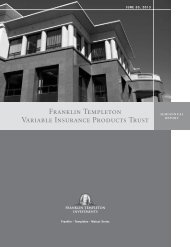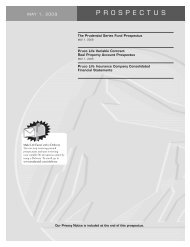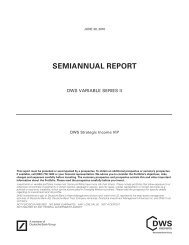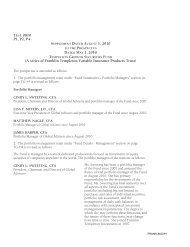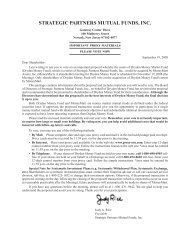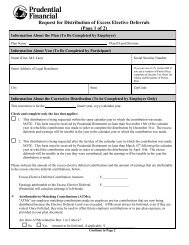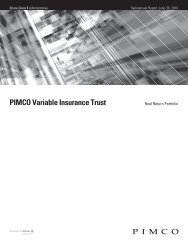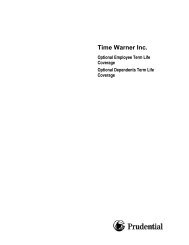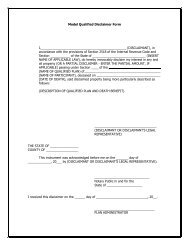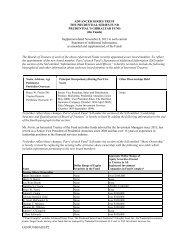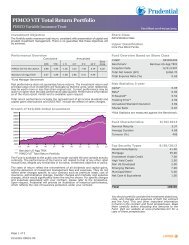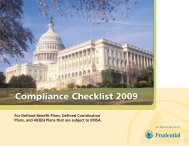The Prudential Series Fund
The Prudential Series Fund
The Prudential Series Fund
Create successful ePaper yourself
Turn your PDF publications into a flip-book with our unique Google optimized e-Paper software.
are not backed by the full faith and credit of the United States. <strong>The</strong> Portfolios may also invest in private mortgage-related securities<br />
that are not guaranteed by U.S. Governmental entities generally have one or more types of credit enhancement to ensure timely<br />
receipt of payments and to protect against default.<br />
Mortgage-related securities include collateralized mortgage obligations, multi-class pass through securities and stripped mortgagebacked<br />
securities. A collateralized mortgage-backed obligation (CMO) is a security backed by an underlying portfolio of mortgages or<br />
mortgage-backed securities that may be issued or guaranteed by entities such as banks, U.S. Governmental entities or broker-dealers.<br />
A multi-class pass-through security is an equity interest in a trust composed of underlying mortgage assets.<br />
Payments of principal and interest on the mortgage assets and any reinvestment income provide the money to pay debt service on the<br />
CMO or to make scheduled distributions on the multi-class pass-through security. A stripped mortgage-backed security (MBS strip)<br />
may be issued by U.S. Governmental entities or by private institutions. MBS strips take the pieces of a debt security (principal and<br />
interest) and break them apart. <strong>The</strong> resulting securities may be sold separately and may perform differently. MBS strips are highly<br />
sensitive to changes in prepayment and interest rates.<br />
Options — A call option on stock is a short-term contract that gives the option purchaser or “holder” the right to acquire a particular<br />
equity security for a specified price at any time during a specified period. For this right, the option purchaser pays the option seller a<br />
certain amount of money or “premium” which is set before the option contract is entered into. <strong>The</strong> seller or “writer” of the option is<br />
obligated to deliver the particular security if the option purchaser exercises the option. A put option on stock is a similar contract. In a<br />
put option, the option purchaser has the right to sell a particular security to the option seller for a specified price at any time during a<br />
specified period. In exchange for this right, the option purchaser pays the option seller a premium. Options on debt securities are<br />
similar to stock options except that the option holder has the right to acquire or sell a debt security rather than an equity security.<br />
Options on stock indexes are similar to options on stocks, except that instead of giving the option holder the right to receive or sell a<br />
stock, it gives the holder the right to receive an amount of cash if the closing level of the stock index is greater than (in the case of a<br />
call) or less than (in the case of a put) the exercise price of the option. <strong>The</strong> amount of cash the holder will receive is determined by<br />
multiplying the difference between the index’s closing price and the option’s exercise price, expressed in dollars, by a specified<br />
“multiplier.” Unlike stock options, stock index options are always settled in cash, and gain or loss depends on price movements in the<br />
stock market generally (or a particular market segment, depending on the index) rather than the price movement of an individual<br />
stock.<br />
Private Investments in Public Equity (PIPEs) — A PIPE is an equity security in a private placement that are issued by issuers who have<br />
outstanding, publicly-traded equity securities of the same class. Shares in PIPEs generally are not registered with the SEC until after a<br />
certain time period from the date the private sale is completed. This restricted period can last many months. Until the public<br />
registration process is completed, PIPEs are restricted as to resale and the <strong>Fund</strong> cannot freely trade the securities. Generally, such<br />
restrictions cause the PIPEs to be illiquid during this time. PIPEs may contain provisions that the issuer will pay specified financial<br />
penalties to the holder if the issuer does not publicly register the restricted equity securities within a specified period of time, but<br />
there is no assurance that the restricted equity securities will be publicly registered, or that the registration will remain in effect.<br />
Real Estate Investment Trusts (REITs) — A REIT is a company that manages a portfolio of real estate to earn profits for its<br />
shareholders. Some REITs acquire equity interests in real estate and then receive income from rents and capital gains when the<br />
buildings are sold. Other REITs lend money to real estate developers and receive interest income from the mortgages. Some REITs<br />
invest in both types of interests.<br />
Repurchase Agreements — In a repurchase transaction, the Portfolio agrees to purchase certain securities and the seller agrees to<br />
repurchase the same securities at an agreed upon price on a specified date. This creates a fixed return for the Portfolio.<br />
Reverse Repurchase Agreements — In a reverse repurchase transaction, the Portfolio sells a security it owns and agrees to buy it back<br />
at a set price and date. During the period the security is held by the other party, the Portfolio may continue to receive principal and<br />
interest payments on the security.<br />
Short Sales — In a short sale, we sell a security we do not own to take advantage of an anticipated decline in the stock’s price. <strong>The</strong><br />
Portfolio borrows the stock for delivery and if it can buy the stock later at a lower price, a profit results.<br />
Short Sales Against-the-Box — A short sale against the box involves selling a security that the Portfolio owns, or has the right to<br />
obtain without additional costs, for delivery at a specified date in the future. A Portfolio may make a short sale against the box to<br />
hedge against anticipated declines in the market price of a portfolio security. If the value of the security sold short increases instead,<br />
the Portfolio loses the opportunity to participate in the gain.<br />
52



